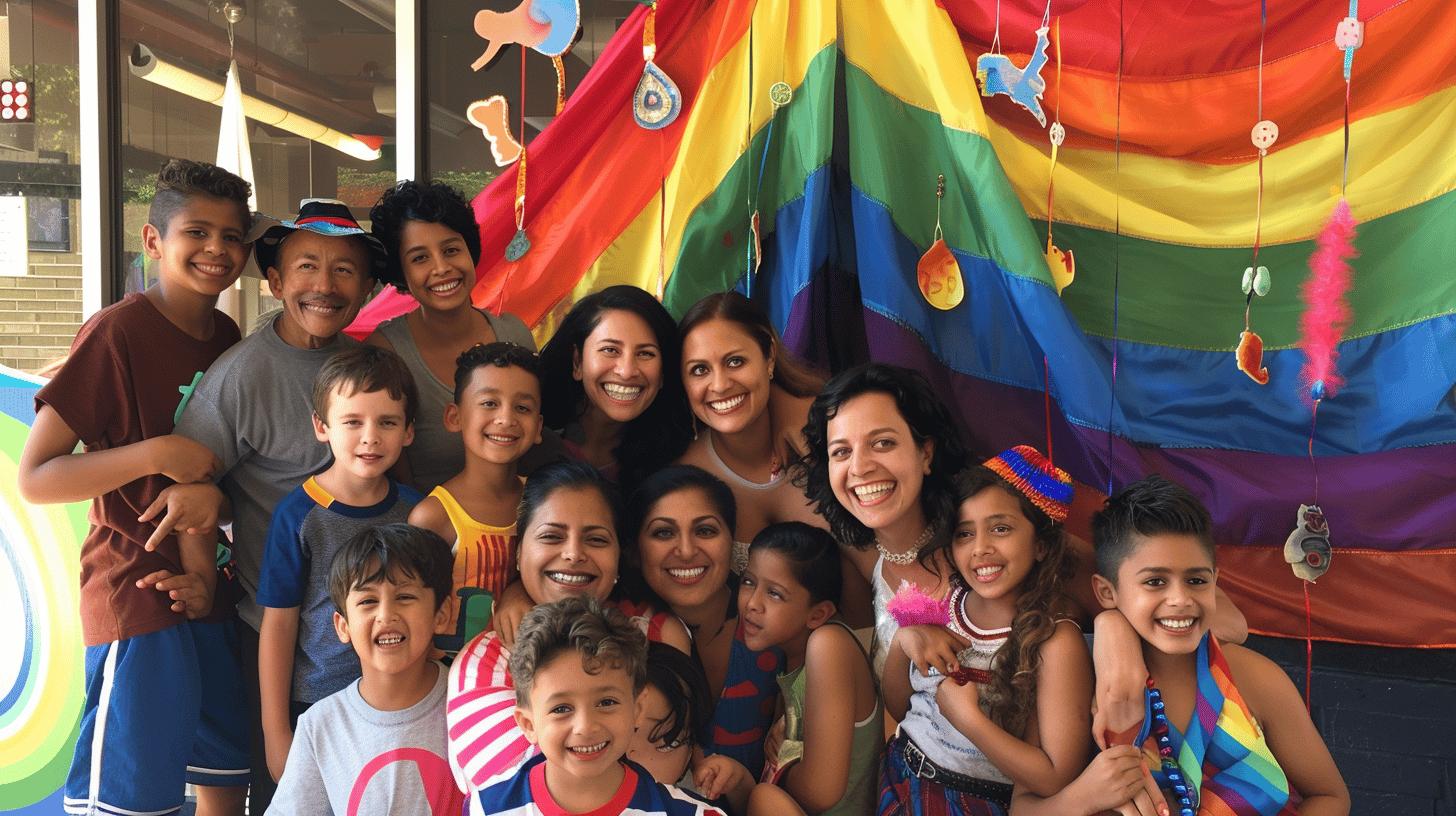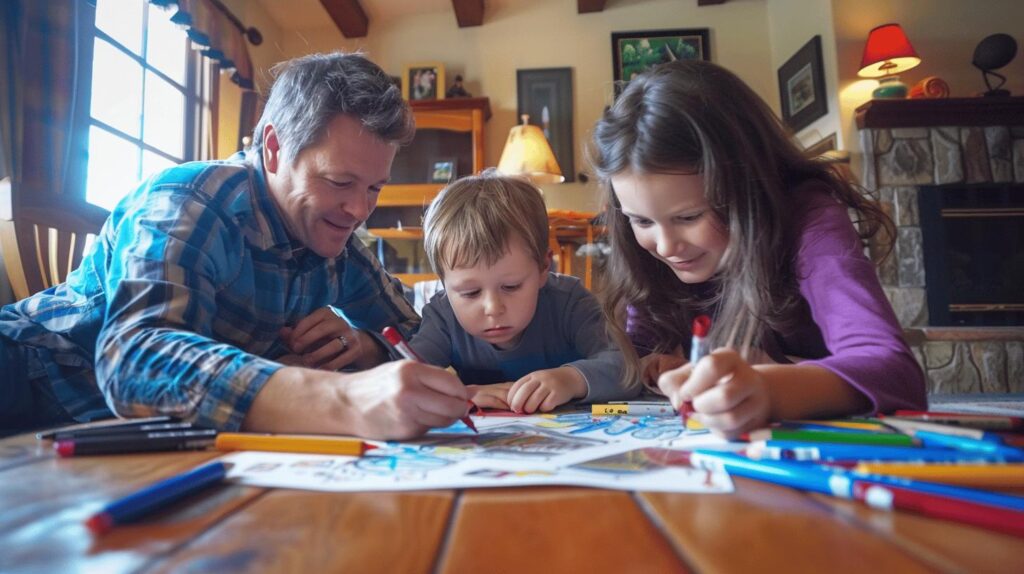Is your child growing up in a world that's inclusive and loving? While every parent wants to raise kind and accepting children, the journey to fostering these values can seem daunting. Parenting with Pride means nurturing an environment where acceptance and understanding flourish, regardless of sexual orientation or gender identity. By embracing these principles, you'll help your child become a compassionate friend, a respectful student, and a confident individual. Dive into our comprehensive guide and discover how to create a home where every family member thrives in their unique identity.
Understanding Parenting with Pride
Parenting with Pride is about raising children to be empathetic, kind, and inclusive. It focuses on fostering acceptance and understanding of all identities. This approach ensures children feel loved and supported regardless of their sexual orientation or gender identity. Core principles include open communication, emotional support, and modeling inclusive behavior.
Inclusivity and acceptance are crucial in Parenting with Pride. These elements help children become great listeners, friends, students, and athletes. They learn to appreciate diversity and show empathy towards others. By fostering a supportive environment, parents can help their children navigate a world that celebrates differences.
- Foster open communication
- Promote emotional intelligence
- Model inclusive behavior
- Encourage empathy and kindness
- Support all identities
Creating an Inclusive Home Environment

Open communication and active listening are foundational to inclusive parenting. When parents actively listen, children feel valued and understood. This practice fosters trust and encourages children to share their thoughts and feelings openly. Parents should ask open-ended questions to prompt discussion and demonstrate that they are genuinely interested in their child's experiences.
Educating oneself and children about LGBTQ+ issues is another critical step. Parents need to stay informed about current topics and challenges faced by the LGBTQ+ community. This knowledge helps in guiding conversations and providing accurate information. Sharing books, documentaries, and articles with children can spark meaningful discussions and broaden their understanding of diverse identities.
Modeling inclusive behavior is essential in creating a safe space for LGBTQ+ youth. Parents should demonstrate respect and acceptance in their daily interactions, using inclusive language and standing against discriminatory behavior. By showing empathy and support, parents set a positive example for their children to follow.
| Strategy | Description |
|---|---|
| Open Communication | Encourage children to express themselves by asking open-ended questions and actively listening. |
| Education | Stay informed about LGBTQ+ issues and share resources with children to foster understanding. |
| Inclusive Language | Use language that respects all identities and correct discriminatory terms when heard. |
| Empathy and Support | Show empathy in daily interactions and support children in their experiences and identities. |
Supporting LGBTQ+ Children and Teens
Providing emotional support and validation is crucial for LGBTQ+ children and teens. When children feel accepted and valued for who they are, their mental health and overall well-being improve. Parents should regularly affirm their child's identity, celebrate their uniqueness, and ensure they know they are loved. Simple acts like using the correct pronouns and showing interest in their experiences can make a significant difference.
Handling discrimination and bullying requires proactive strategies. Parents must educate their children about the realities of discrimination and equip them with tools to handle such situations. Encourage open discussions about their experiences with bullying and reassure them that it is not their fault. Role-playing different scenarios can help children feel more prepared to face challenging interactions. Additionally, parents should advocate for their child’s rights in schools and other community settings, ensuring there are policies in place to protect against harassment and bullying.
Personal stories from LGBTQ+ families highlight the diverse experiences and challenges faced, offering insights and inspiration for others. For instance, one family shared how they navigated their child's coming out process by seeking support from LGBTQ+ parent groups. This helped them understand their child's journey and provided a community of allies. Another parent described how they worked with teachers to create a more inclusive school environment, which significantly improved their child's comfort and confidence.
Addressing Bullying and Discrimination
Parents can take several steps to help their children navigate bullying and discrimination:
- Foster Open Communication: Encourage children to share their experiences and feelings about bullying.
- Educate and Empower: Teach children about their rights and provide them with strategies to stand up against bullying.
- Role-Playing: Practice different scenarios to build confidence in handling confrontations.
- School Involvement: Work with educators to implement anti-bullying policies and create a supportive school environment.
- Seek Resources: Utilize community organizations and support groups for additional guidance and support.
Community Resources for LGBTQ+ Families

Community support is essential for LGBTQ+ families. Access to resources such as local LGBTQ+ centers, counseling services, and inclusive schools can provide invaluable assistance. These resources offer guidance, emotional support, and a sense of belonging. They help parents navigate the challenges that may arise as they raise their children in an inclusive and loving environment. Local LGBTQ+ centers often host family-friendly events and support groups, creating a safe space for children and parents to connect with others who share similar experiences.
Books, online communities, and support groups are also valuable resources for parents seeking guidance. Books can offer insights into LGBTQ+ issues and provide strategies for fostering an inclusive home. Online communities allow parents to connect with others, share experiences, and seek advice in real-time. Support groups offer a more personalized approach, where parents can discuss their unique challenges and receive targeted help. These resources collectively contribute to a supportive network that empowers parents to raise their children with pride and understanding.
- Local LGBTQ+ Centers: Provide family-friendly events, support groups, and resources.
- Counseling Services: Offer mental health support tailored to LGBTQ+ individuals and families.
- Inclusive Schools: Create supportive educational environments for LGBTQ+ children.
- Books: Offer insights and strategies for inclusive parenting.
- Online Communities: Enable real-time advice and experience sharing.
- Support Groups: Provide personalized support and guidance.
Celebrating Pride as a Family
Participating in Pride events as a family is significant because it fosters a sense of belonging and acceptance. These events promote empathy and understanding among all family members, enhancing family unity. By attending Pride parades, festivals, and community gatherings, families can show their support for the LGBTQ+ community and celebrate diversity. This participation also provides an opportunity for children to see positive representations of LGBTQ+ identities, reinforcing the values of inclusivity and respect.
During Pride Month, families can engage in various activities to celebrate together. Consider hosting a Pride-themed movie night, where you watch films that highlight LGBTQ+ stories and experiences. Crafting rainbow-themed decorations and baking colorful treats can be fun and educational activities for younger children. Additionally, attending local community events, such as drag queen story hours or family-friendly Pride picnics, can create memorable experiences and further strengthen family bonds.
Expert Advice and Best Practices

Continuous education and seeking expert advice are pillars of successful parenting with pride. Staying informed about LGBTQ+ issues helps parents provide the best support for their children. By regularly attending workshops, reading current literature, and engaging with expert-led discussions, parents can stay updated on best practices and effective strategies. This ongoing learning process ensures that parents are well-equipped to address their children's needs and foster an inclusive home environment.
Workshops and resources play a crucial role in enhancing parenting skills. Programs like Tools Inspiring Action! TM offer specialized workshops and resources that can be used both at home and in schools. These workshops focus on practical strategies for creating safe and supportive environments for LGBTQ+ children. They teach parents how to handle sensitive topics, address discrimination and bullying, and advocate for their children's rights. Utilizing these resources can significantly improve a parent's ability to navigate the complexities of raising LGBTQ+ children.
Experts recommend several best practices for parenting with pride. These practices include fostering open communication, providing emotional support, and modeling inclusive behavior. Parents are encouraged to create a home environment where children feel safe expressing their identities. Additionally, involving children in community activities and support groups can enhance their sense of belonging and acceptance. By following these expert-recommended practices, parents can help their children thrive in a loving and inclusive environment.
- Continuous Learning: Stay informed about LGBTQ+ issues through workshops, literature, and expert discussions.
- Open Communication: Encourage children to share their thoughts and experiences without fear of judgment.
- Emotional Support: Regularly affirm your child's identity and celebrate their uniqueness.
- Model Inclusive Behavior: Demonstrate respect and acceptance in daily interactions.
- Community Involvement: Engage with LGBTQ+ support groups and community activities to foster a sense of belonging.
Final Words
Parenting with pride focuses on raising children who are inclusive and accepting. It involves understanding all identities and creating a supportive home.
Creating an inclusive home environment requires open communication and self-awareness. Educate your family about LGBTQ+ issues and model inclusive behavior.
Supporting LGBTQ+ children involves providing emotional support and addressing discrimination. Personal stories offer valuable insights for navigating these challenges.
Community resources are vital for support. Utilize local LGBTQ+ centers, counseling services, and inclusive schools.
Celebrating Pride as a family fosters belonging and unity.
Expert advice and workshops can enhance your parenting skills, ensuring you're well-equipped for effective parenting with pride.
FAQ
What is parent pride?
Parent pride is the feeling of pride parents have for their children, often based on their achievements, qualities, or milestones.
How do you deal with a prideful child?
Dealing with a prideful child involves promoting humility and empathy. Encourage them to understand others' perspectives and to appreciate teamwork and shared achievements.
What to do when your daughter turns against you?
When your daughter turns against you, maintain open communication and show understanding. Seek to address underlying issues and consider family counseling if necessary.
What if I don't want my child anymore?
Feeling overwhelmed as a parent can happen. Seek immediate help from social services, a counselor, or support organizations to discuss options and receive guidance.


